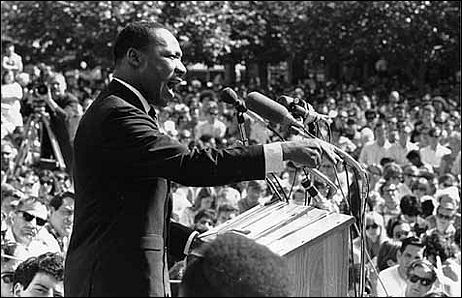The following point was brought up by Bill Maher and a few columnists last week, but the ignorance or tunnel vision that was in effect during last week’s Martin Luther King tributes wasn’t, by my sights, widely acknowledged. It can’t hurt to point it out again.

Overlooked in all the pious and rotely kowtowing speeches heard on the 40th anniversary of King’s murder (the ones by Hillary Clinton and John McCain struck me this way especially) is the fact that during the last two or three years of his life (’65 to ’68), King said a lot of the same things — damning indictments of U.S. warfare, calling the waging of war in Vietnam evil, predicting God’s vengeance, etc. — that Rev. Jeremiah Wright said in the pulpit on that revolving tape loop.
But none of the speechifiers wanted to go there last Wednesday. Because Clinton, McCain and others hadn’t the slightest interest in remembering some of what the deified King actually believed and said, particularly during the last year of his life. They just want to salute the up-with-people platitudes — the safe stuff — from the early to mid ’60s.
As Gary Yonge said a week ago on commondreams.org., “Wright is no King. His delivery is too shrill, his demeanour too hectoring, his message insufficiently unifying. Nonetheless, Wright and King come from the same tradition of militant religious leadership that has been a hallmark of black political life for well over a century. Under slavery and then segregation, the church was one of the few places that African-Americans could gather and organize autonomously — giving primacy, for better and for worse, to the pulpit and the preacher in black politics.
“It is unlikely King would have fared any better on YouTube or the blogosphere than Wright did,” Yonge goes on. “King, like Wright, was excoriated for opposing the ‘senseless and unjust war’ in Vietnam. ‘The reaction was like a torrent of hate and venom,’ recalled one of his aides, Andrew Young. ‘As a Nobel prizewinner we expected people not to agree with it, but to take it seriously. We didn’t get that. We got an emotional outburst attacking his right to have an opinion.”
“A few months before he died, King told parishioners at his church in Montgomery, Alabama: ‘We are criminals in that war…we’ve committed more war crimes almost than any nation in the world. But God has a way of even putting nations in their place.’ And how would God deal with an unrepentant America? ‘And if you don’t stop your reckless course, I’ll rise up and break the backbone of your power.'”
In an April 4, 1967 appearance at the New York City Riverside Church — exactly one year before his death — King delivered ‘Beyond Vietnam: A Time to Break Silence,’ says his Wikipedia bio. “In the speech he spoke strongly against the U.S.’s role in the war, insisting that the U.S. was in Vietnam ‘to occupy it as an American colony’ and calling the U.S. government ‘the greatest purveyor of violence in the world today.’ But he also argued that the country needed larger and broader moral changes:
“King was long hated by many white southern segregationists, but this speech turned the more mainstream media against him. Time called the speech ‘demagogic slander that sounded like a script for Radio Hanoi,’ and the Washington Post declared that King had ‘diminished his usefulness to his cause, his country, his people.'”
Barack Obama chose to breathe the air of Ft. Wayne, Indiana rather than that of Memphis, Tennessee, on the 4.4 anniversary. By staying away from the congregation of media in Memphis and the usual blah-blah that the media always seems to engender, I think he did the right thing.









